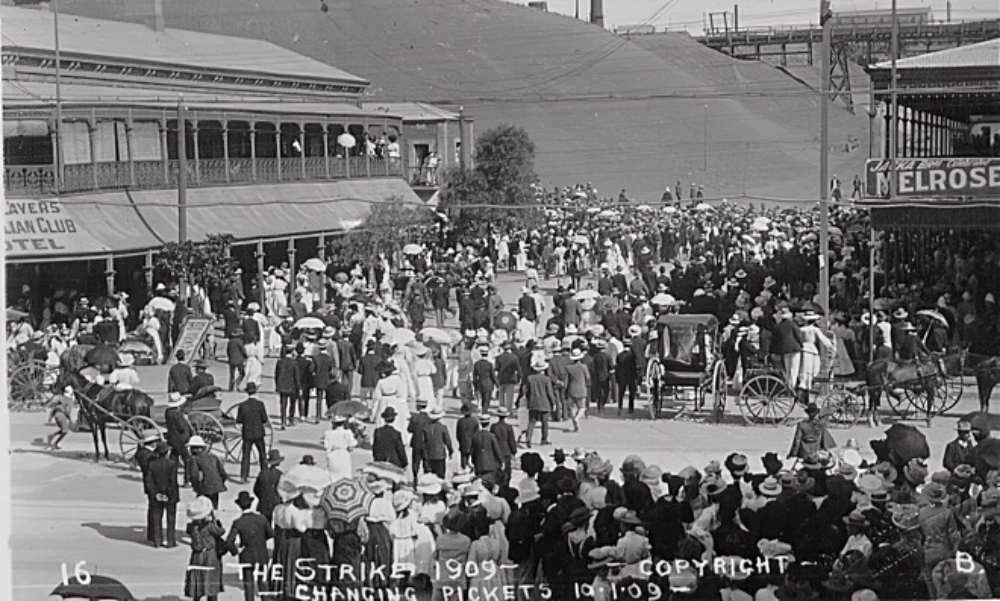Tom Mann the Social activist from Great Britain addressed the Women’s League on Wednesday 14th October, 1908 urging them to ‘resist any lowering of the standard of living on the Barrier, and calling upon the men to claim the half-holiday as a reasonable concession’ to their demands in the Award negotiations due for review in December. The crowds in the Trades Hall overflowed and he had to address a mixed audience and repeat his speech outside. You will note the number of children and families in attendance. His next speech on Monday October 19th, dealt with the importance of Industrial action to fight a Class war against the capitalist Mining Companies. The AMA invited Tom Mann and Lizzie Ahern to address a mass meeting at the outbreak of the strike. He delivered a speech on January 8th 1909 that incited women to lead the procession against the police and scabs the following day. A violent street battle ensued, during which Tom Mann and twenty seven male protesters were arrested. Thousands of townsfolk encamped around the gaol.

Most of the protesters were acquitted or fined, some served short sentences. Tom Mann was released on a bond not to make speeches in New South Wales or assist the strikers. This lead him to deliver two speeches at Cockburn across the South Australian Border, which were attended by hundreds of citizens who boarded special ‘Picnic’ trains to and from the events. His ‘Open Letter to Trade unionists on Methods of Industrial Organisation’ was published by the Barrier Daily Truth in May 1909. He called for solidarity in the face of sectional interests. He saw a people disenchanted with politics and parliaments superseding the Capitalist order with a Federation of Unions, initiatives and referendums. He preached a Class revolution in which the new order would depend upon the intelligence of the worker.
The Barrier Socialist group recognised the importance of education. In January 1908, at the Paris Commune celebrations, the socialist newspaper ‘The Flame’ called for women and children to be politically aware. They invited Tom Mann, the British trade union orator, to Broken Hill to found the Socialist Sunday School. Meetings were held at the Trades Hall and combined hymn singing with industrial union activism. It is important to note that Tom Mann went in to the British Coal Mines as a labourer at ten years of age. The earliest mines of the Barrier Ranges relied upon the labour of children as ‘picky boys’. Sunday was their day of rest and education.
Tom Mann’s speeches to the Women’s movement in October 1908, connected local women with the international women’s movement for social reform. The Barrier Daily Truth ran a virulent women’s column with regular contributors who responded:
‘Why should the men fight the battle alone, while the children must eat bread and treacle to save the meat for the men who work underground?’
Tom Mann’s speech on, ‘The Social Upheaval, its causes and cure’ urged women to use their ‘influence’ to get their men to join the union.
Unfortunately Union membership remained low and again the strike action was unsuccessful. On March 12th, Justice Higgins had ruled that the workers at Broken Hill and Port Pirie should return to work with no change to wages but hours reduced to 46 hours per week. The Broken Hill Propriety Company took the dispute to the High Court and clawed back the two hours per week concession. On May 19th , the miners agreed to return to work at pre-strike wages and hours. However, Broken Hill Proprietary Company did not resume underground operations. In addition to blackballing union strikers, they operated only surface workings treating the skimp dumps for two years. They turned toward other fields and diversified their interests. It was the beginning of the end of the ‘Big Mine’ in Broken Hill.
